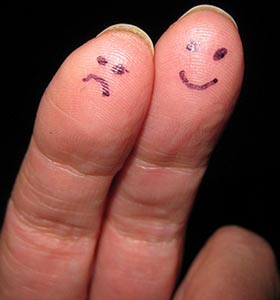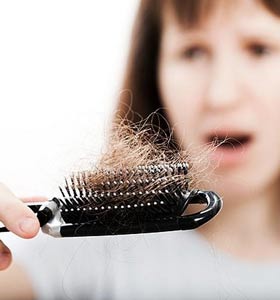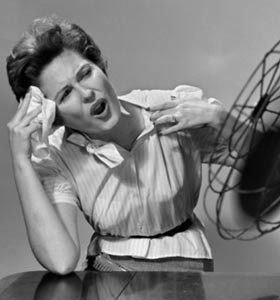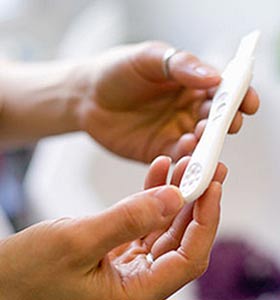Memos on Menopause: What Every Woman Needs to Know
When Change is Inevitable

Menopause is unavoidable. That's a fact. Symptoms typically start between the ages of 45 and 55 (average age 51), although sometimes they can occur in women as young as 30.
But knowing what to expect, and keeping a positive frame of mind throughout this change is the best way to deal with it. Remember, unless you have had surgery to remove your ovaries, or they have been damaged by chemotherapy, it doesn't happen overnight.
So let's find out a bit more about it and not let it change your life!
3 Stages of The Transition

The term "menopause" is often used to describe the years before, during and after the cessation of menstruation. In fact there are three stages; perimenopause, menopause, and postmenopause.
Perimenopause describes the years leading up to menopause. During this time period, hormones are still present, but their levels fluctuate erratically.
Menopause is the day after a woman's final period. Doctors consider menopause complete if a woman has not had a period for at least a year.
The term postmenopause is used for the years following menopause.
Why Does Menopause Happen?

The most commonly held belief is that girls are born with a finite number of eggs (approximately two million) which start dying off in their thousands every month from the day of birth. Symptoms of menopause start to occur when these egg numbers get below a crucial level and the ovaries start producing fewer hormones.
But it seems we don't know all there is to know about ovaries. Recently, scientists have discovered that it does seem possible for young women to generate new egg cells. Which means there's much more to the story than a trickling away of a fixed pool of eggs.
What Symptoms Can I Expect?

Symptoms during perimenopause are caused by fluctuating hormone levels and vary greatly between women.
Some breeze through menopause, while others find the going a bit tough. But it is all just temporary.
The most common symptoms are:
- absent, short, or irregular periods
- depression or anxiety
- hair loss or thinning
- hot flashes (flushes)
- less interest in sex
- mood swings
- night sweats
- sleep disturbances
- tiredness
- vaginal dryness
- and weight gain.
My Periods Are Different. Am I Going Through Menopause?
90% of women experience absent, short, or irregular periods leading up to menopause.
Periods may occur earlier or later than before; bleeding may be lighter or heavier; menstruation may last only for a day or two or seem to go on forever. Periods may be irregular for three to ten years before stopping completely.
Other causes of irregular periods include endometriosis, fibroids, diabetes, cancer, and several other health conditions. Lifestyle changes such as losing a lot of weight or strenuous exercise can also affect bleeding. Your doctor can run tests to determine if your symptoms are due to menopause or not.
What Can I Do About My Thinning Hair?

Some women describe hair loss as one of the more distressing symptoms of menopause.
Hair follicles require estrogen to sustain hair growth, and fluctuating levels of this hormone during perimenopause means that most women show some degree of hair loss or thinning. How much is lossed generally depends on how much hair you had to start with. Hair may also become drier and more brittle than usual.
Eat a balanced diet and be careful using products such as bleach, henna, dye or hair relaxers. Brush your hair gently and ask your hairdresser to suggest a new style that maximizes your hair fullness. Choose a good quality shampoo and conditioner, and protect your hair from salt water and the sun.
From Zero to Hot in One Second

Hot flashes (also called hot flushes) are experienced by almost half of all perimenopausal women, and by 75-85% of all postmenopausal women. These flashes can range from a delicate blush to a sensation of engulfing flames. Severity generally varies depending on whether or not estrogen production by the ovaries gradually declines or abruptly stops.
Wearing lighter clothes, carrying hand-held fans, and avoiding hot spicy foods or rushing around can help minimize occurrences. If needed, talk to your about the short-term use of FDA-approved treatments such as estrogen therapy, or nonhormonal drugs such as Brisdelle (paroxetine), a low-dose antidepressant. Gabapentin and clonidine have also been beneficial at reducing hot flushes.
Talk to your doctor about the need for treatment to reduce your risk of osteoporosis or bone fractures, such as vitamin D supplements or bisphosphonates.
Sex May Become Uncomfortable
Declining estrogen levels bring about changes to the tissues inside the vagina. These tissues lose moisture, and become drier and thinner and less elastic. Lack of lubrication makes sex uncomfortable and symptoms such as itch, irritation, and an increased incidence of infections are common.
Water-based vaginal lubricants (such as Astroglide, FemGlide, K-Y Jelly) are helpful during sex and vaginal moisturizers (for example Fresh Start, K-Y Silk-E, Replens) reduce symptoms that persist during the day.
See your doctor if your vaginal dryness is particularly severe or painful or if you experience pain during sex. Treatments such as Vagifem, Estrace, Estring, Premarin, and Imvexxy are available on prescription. Intrarosa is a once-daily vaginal insert approved late 2016 for women aged 40 to 80 years of age with moderate-to-severe pain during sexual intercourse. The non-hormonal product Osphena (ospemifene), helps to reverse certain changes in vaginal tissue caused by menopause, and can also help reduce pain associated with sex.
Infertility May Be Due To Premature Menopause

Premature menopause is menopause that occurs in women under 40. Some women only discover they have gone through menopause early when they have difficulty becoming pregnant and tests reveal they are postmenopausal. Others have all the symptoms of menopause; just much earlier than normal. Premature menopause is diagnosed in 1% of women and tends to run in families.
Scientists have recently identified a way to induce ovaries in infertile women to produce eggs. This may allow women with early menopause the ability to become pregnant with their own eggs.
Losing Interest in Sex

Many women going through menopause experience loss of libido for a number of reasons. Vaginal dryness may make sex uncomfortable, or weight gain may make a woman feel less desirable. Declining hormones decrease sex drive and tiredness just means its the last thing you feel like doing when you jump into bed.
But this lack of sex drive is usually only temporary and many women describe their years postmenopause as the most vibrant and passionate of their life. No more pregnancy worries, no children to tend to in the middle of the night, and loads of uninterrupted time with your partner.
Rite of Passage to a More Carefree Life?

Dreading menopause is a particularly Western type of attitude. Many other cultures around the world regard it more positively, as it gives women more status, not less.
In fact, many women breeze through menopause and find that it gives them a new lease of life. The benefits of not having to worry about getting pregnant anymore, debilitating mood swings, or monthly periods far outweigh the negatives of having gone through menopause. Strange food cravings or binges tend to disappear, and most women find it easier to keep up their energy levels, experiencing less fatigue.
Embrace Your Menopausal Zest

Far from having their sex life dry up, a lot of women find themselves feeling sexier. Confidence tends to increase, and they feel empowered to go out and start up that new company, write that novel, or travel the world.
This increased enthusiasm for life and energy rush has been nicknamed the "Menopausal Zest".
Sure menopause brings about change, but embrace it and reap the benefits!



No comments:
Post a Comment